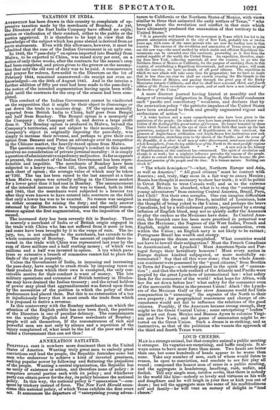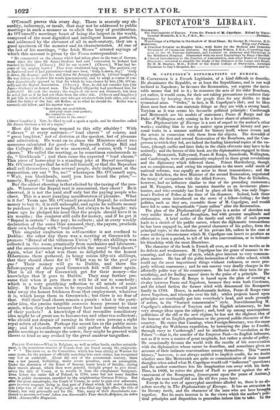LOUD CHEERS.
Mew is a strange animal, but that complex animal a public meeting is stranger. Its vagaries are surprising, and baffle analysis. It al- ways seems to have more force than sense. Two heads are better than one, but some hundreds of heads appear to be worse than none. Take any number of men, each of whom would listen to reason, be open to conviction, and resolute to see fair play all round ; compound the honest men of sense in a public meeting., and the aggregate is headstrong, headlong, rash, unfair, and foolish. Tell any single man tad= verbie, that there is nobody in the world like him—nobody so lovely and virtuous as his wife and daughters and he will laugh in your face or kick you out of doors ; but tell the aggregate man the same of his multitudinous self and family—he will vent an ecstasy of delight in "loud cheers." O'Connell proves this every day. There is scarcely any ab- surdity, indecency, or insult, that may not be addressed to public meetings in such a manner as to elicit the bray of gratification. As O'Connell's meetings boast of being the largest in the world, composed of the most dignified and intelligent human particles, and addressed by the cleverest of all in mob-oratory, they are a good specimen of the monster and its characteristics. At one of the last of his meetings, "the Irish Moses" uttered sayings of
which this account is given by the Times correspondent- " He commented on the change which had taken place in the tone of Govern- ment since the time Sir James Graham had said concession to Ireland had reached its limits.' (Cheers.) Did he say so now? (Cheers.) What had be- come of his mighty words? They were swallowed long ago. The patriotic cry in Spain—if ever it had patriotism—had once been, Gulp it down, dog!' 'Gulp it down, Sir Jemmy,' said he- and down Sir Jemmy gulped it. (Great laughter.) He was driven to swallow his words ignominiously, and to adopt a course of con- duct diametrically opposed to that for which he was chosen by him (Mr. O'Con- nell) and the Repeal Association. (Cheers.) Now, he did not consider Lim (Sir James Graham) an honest man. 1 he English Oligarchy had purchased him for 1,509,0091. He took the money; the wages of sin were not returned; but then he acted just as if he had got them from the other side. (Cheers and laughter.) It put him in mind of a barrister once who got retainers from both sides, and con- sulted the father of the bar, old Keller, as to what he should do. Keller was a sarcastic old fellow, and his answer was— 'Keep both, my good fellow,
And pray cease your pother;
Be counsel to one,—
Give advice to the other.'
(Great laughter.) Now, he liked to call a spade a spade, and he therefore called
Sir James Graham a bit of a rogue."
How did the meeting respond to this silly ribaldry? With " cheers " at every sentence—" loud cheers" of course, and "great laughter,' not of derision at the speaker, but of pleasure and admiration. He went on to abuse the Ministers about two measures calculated for good—the Maynooth College Bill and the Colleges Bill ; and he was answered, of course, with "loud cheers." He called the meeting, as he sometimes condescends to do " blockheads " ; and then came the expected "loud cheers." This piece of horse-play is a standing joke at Repeal meetings : Mr. O'Connell says that he will sell himself, or that the Repealers shall sell themselves ; then several people, duly indignant at the supposition, cry out " No, no !" whereupon Mr. O'Connell says, "Wait, you blockheads, until you have heard the price,"— namely, Repeal : "loud cheers."
But the oddest cheering is that elicited by the taxing of the peo- ple. Whenever the Repeal rent is announced, they cheer I Be it observed, it is not the paid staff only but the paying people who cheer. This is a most puzzling manifestation of pleasure. What is it for? Years ago Mr. O'Connell promised Repeal; he collected money to buy it; it is still unbought, and again he collects money to purchase it : it is never bought, but always to be bought: two years ago he pledged his head that the people should have it in Bra months ; the conjuror still calls for money, and if he get it "-Repeal is certain ": they pay; he collects ; and at every weekly declaration of the sums thus amassed, they, the payers, proclaim their own befooling with "loud cheers." This singnlar exultation in self-sacrifice is not confined to Dublin: the other day there was a meeting at Greenwich to promote "Repeal of the villanous Union"; fifty-six shillings was collected in the room, principally from mechanics and labourers: and the announcement was greeted with the usual "loud cheers." Again, what for? what was there so delightful to the honest Hibernians there gathered, in being minus fifty-six shillings, that they should cheer for it ? What was to be the quid pro quo? Their money will go to Dublin and there the fellow-payers of these good Greenwich folk will cheer again. That is all they of Greenwich get for their money—the knowledge that it (foes to Dublin. They may further pre- sume that when it gets there it will be of use to somebody ; which is a very gratifying reflection to all minds of sensi- bility. If the Union were to be repealed indeed, it would just take away the honest Irishmen from that employment, whatever it is, which keeps them in Greenwich ; but there is no fear of that. Still their loud cheers remain a puzzle : what is the parti- cular idea, the precise tangible summum bonum present to their minds, when they cheer because they have had money taken out of their pockets ? A knowledge of that recondite conciliatory idea might be of great use to Income-tax and other tax-collectors ; who should not despair of earning in their own persons a right royal salute of cheers. Perhaps the secret lies in the public meet- ing ; and if tax-collectors would only gather the defaulters in public meetings to undergo the screw, they might be greeted with cheers as loud as any evoked by the great amateur taxgather.



























 Previous page
Previous page